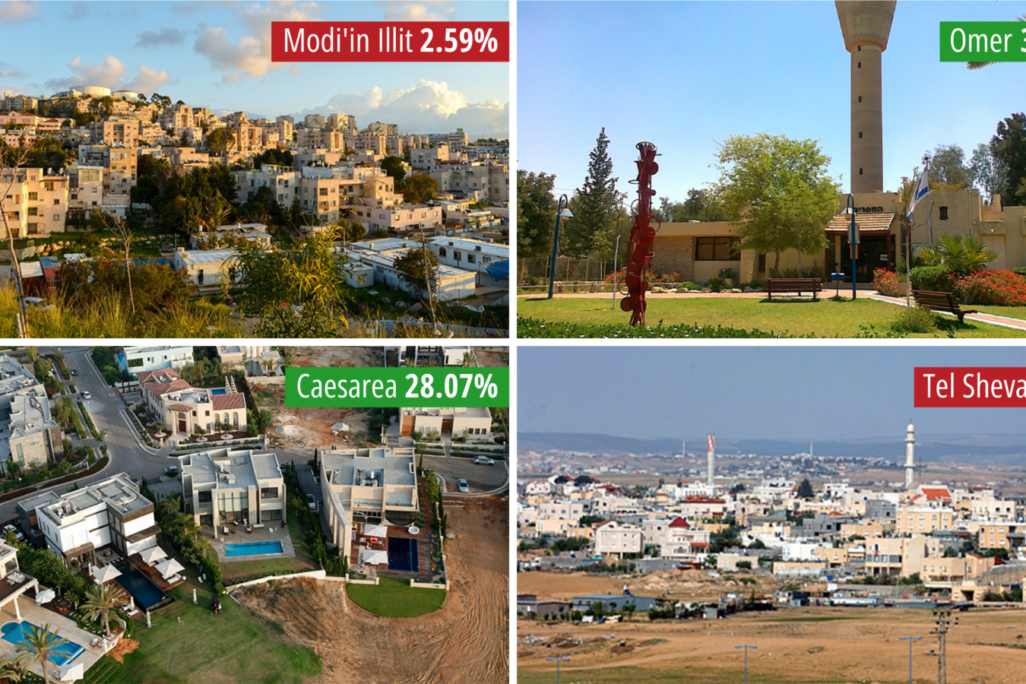
While Israel has received accolades for its rapid and comprehensive vaccination campaign, and justly so, not everyone is being vaccinated equally. In Davar’s analysis of new data published last week by the Ministry of Health, showing vaccination rates by area (correct as of Sunday January 10th), there is a noticeably high correlation between the socio-economic status of the locality and the rate of vaccination.
This is especially clear in areas dominantly populated by the Arab and ultra-Orthodox communities, where the rate of vaccinations is very low. Both populations tend to be lower-income.
It should also be noted that both Arab and ultra-Orthodox areas have larger numbers of young people in the population, who are not currently eligible for vaccination. However, this difference alone does not explain the extent of the gap in the rate of vaccines.
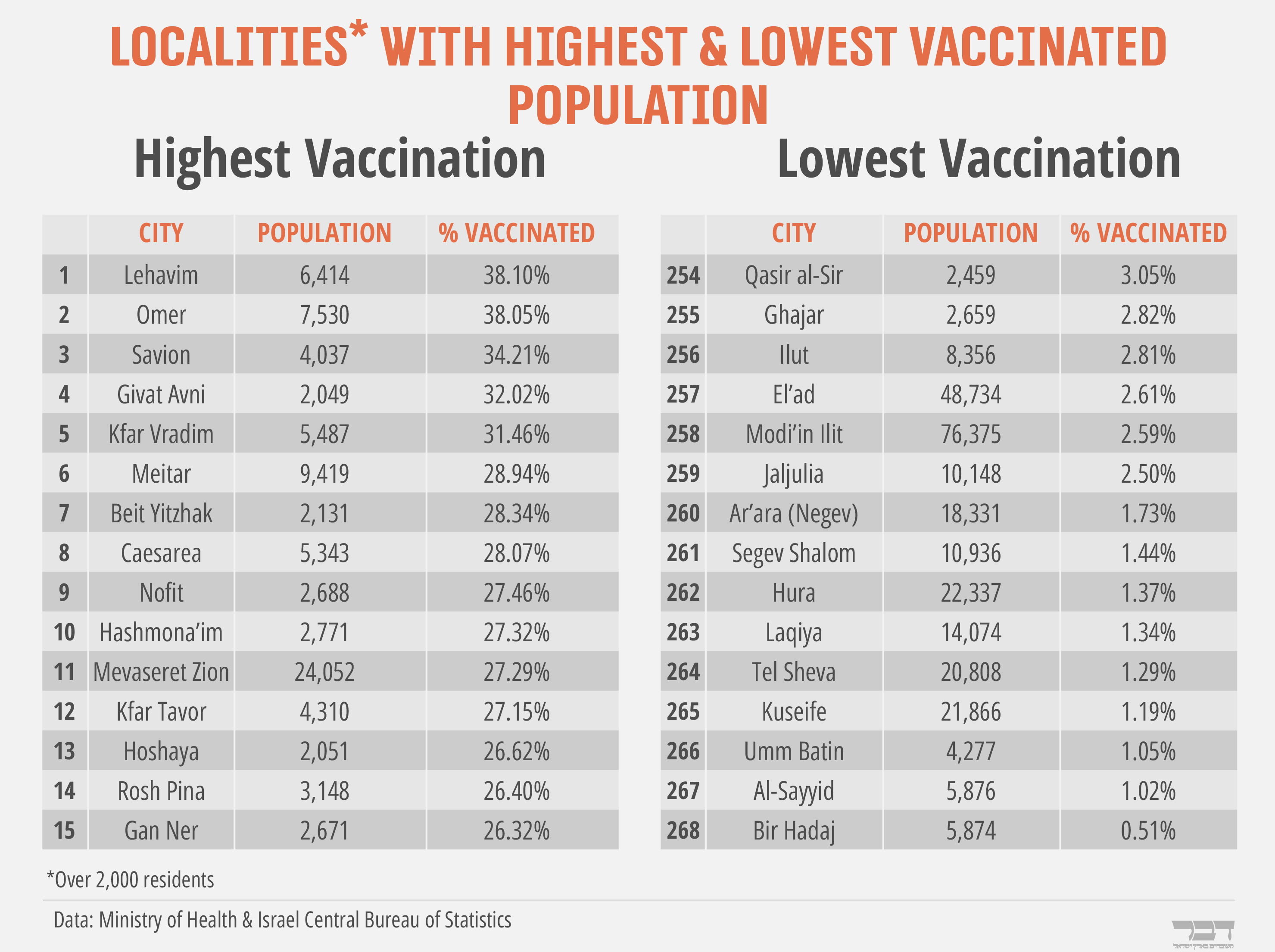
According to the data, the most vaccinated localities in Israel are also three of the four most economically strong localities in Israel: Lehavim (1), Omer (2) and Savyon (3), all three of which are in Cluster 10 in the Consumer Bureau of Statistics (CBS) index, meaning the highest ranked group for geographic proximity to population and economic centers.
The first non-Jewish settlement on the list is the Christian Arab village of Gush Halav (42nd place), followed by the Druze village of Ein Kaniyye (45the place) and the Circassian village of Kfar Kama (54the place). The large city of Sakhnin holds the 94th place, with 15.97% of the population vaccinated. The last 10 places on the list belong to Arab localities, where the vaccination campaign has barely begun, with less than 2.5% vaccinated.
Several Bedouin communities are not on the list due to data collection difficulties, but according to the Ministry of Health, the number of vaccinations there is very low.
Ultra-Orthodox areas do not fare any better in the Ministry of Health’s statistics. The city of Modi'in Illit is in 258th place with 2.59% of the population vaccinated, and the city of Elad is one place higher with 2.61%. The city of Bnei Brak is in 214th place with 6.19% vaccinated.
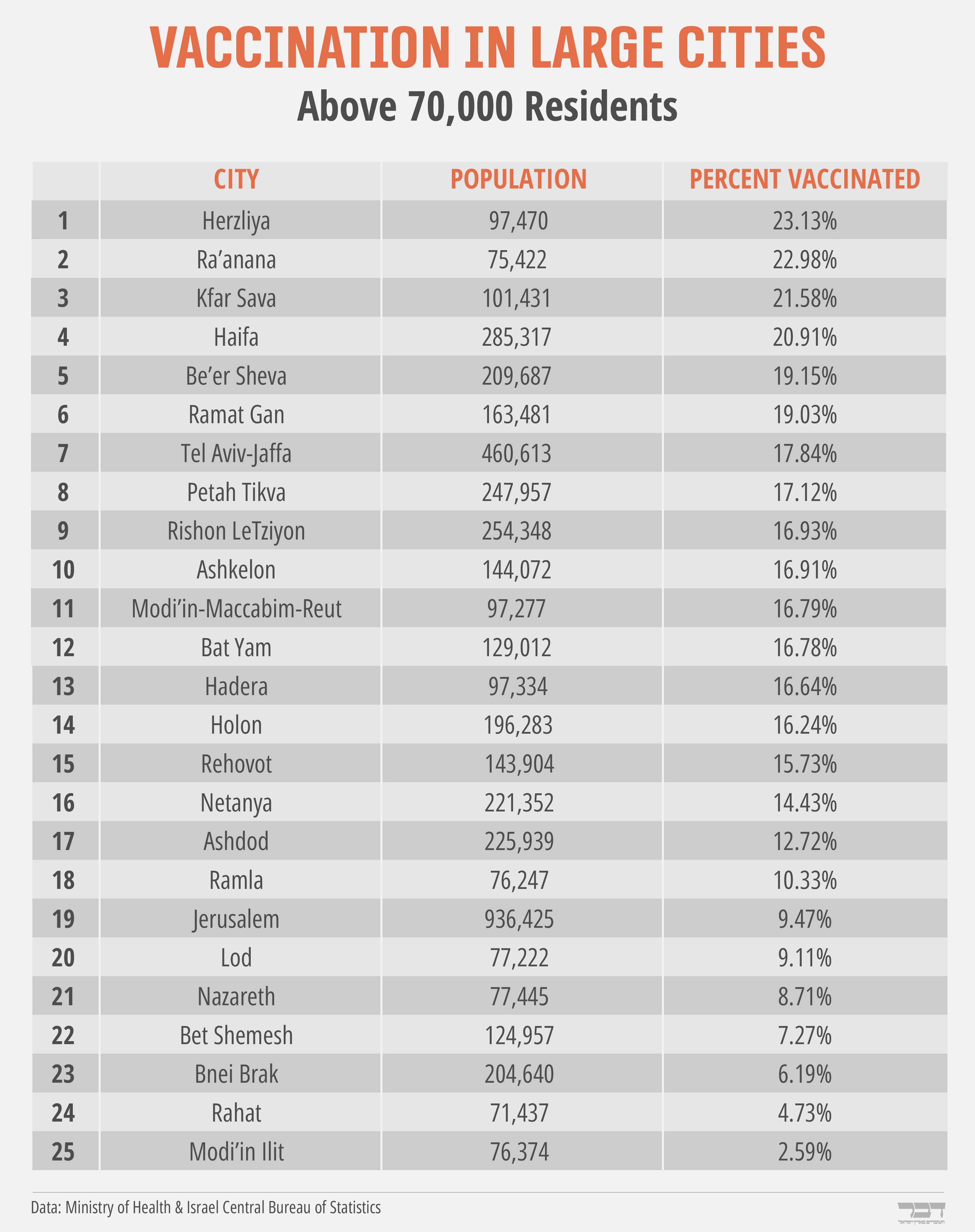
In the big cities (over 70,000 inhabitants), the most vaccinated city is Herzliya with 23.1% vaccinated. Tel Aviv is in 7th place with 17.84% vaccinated, Haifa in 4th place with 29.1% vaccinated, and Jerusalem in 19th place with 9.47%. Modi'in Illit is in last place with only 2.5% vaccinated.
"The issue of cultural accessibility"
The vaccines are free for everyone, which ideally creates equal access for all populations within Israel. However, it isn’t that simple, according to Professor Nadav Davidovitch of the School of Public Health at Ben Gurion University. He says that there are large gaps in access to public health services between the geographic center and periphery, and between different ethnic or religious groups.
"Access to health services consists of many aspects, not just financial access,” he explained to Davar. “There is also physical accessibility. In the beginning, vaccination centers were established faster in the center of the country, in large cities and in communities with a Jewish majority, and slower in the periphery, in smaller communities and in Arab communities."
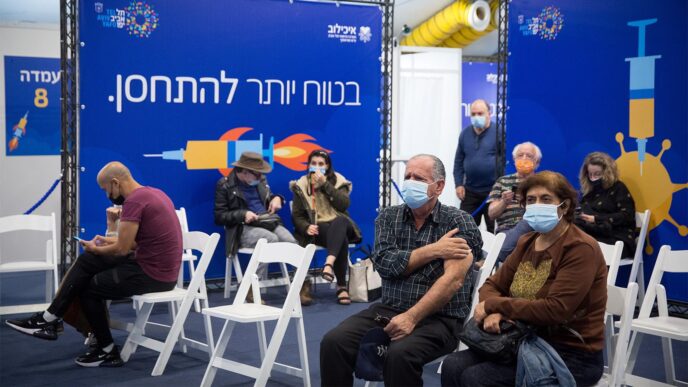
“There were three vaccination centers in the Arab localities out of 20 established in the beginning,” added Professor Nihaya Daoud, a researcher at the School of Public Health at Ben Gurion University. “The chances of people reaching them are lower, and the arrivals were so slow that there are places that have traveled to fetch the patients from their homes."
"Overall, the vaccine drive was very rapid and later on, a considerable part of the problems were fixed, but not completely,” Davidovitch continued. “In addition to physical accessibility, there is the issue of cultural accessibility, how information is presented, how residents are actively called on to get vaccinated, and active campaigning against fake news. Here too there was a certain delay towards the Arab population. This is not surprising, unfortunately.”
“They are afraid and suspicious of the system”
According to Dr. Bashra Bisharat, chairman of the Society for the Promotion of the Health of the Arab Population within the Medical Union, the rate of vaccination is about 5%, compared to 14% in the whole country. A survey conducted by the Afkar Institute during the second week of December shows that alongside the high levels of fear of infection by corona in the Arab population (74%), there is a relatively low willingness to get vaccinated (41% willing).
The survey also shows that among the elderly Arab population (aged 40 and over) there is a strong reluctance to the vaccine (only about 6% expressed a willingness to be vaccinated). Despite considerable fear of infection (81%) among young people, the reluctance is even greater, with only about 33% expressing a willingness to get vaccinated.
"The unwillingness to get vaccinated in Arab society stems from a low sense of trust in the system and the establishment," said Prof. Daoud. "This is in light of the failed response to corona and neglect in the Arab communities. They are afraid and suspicious of the system."
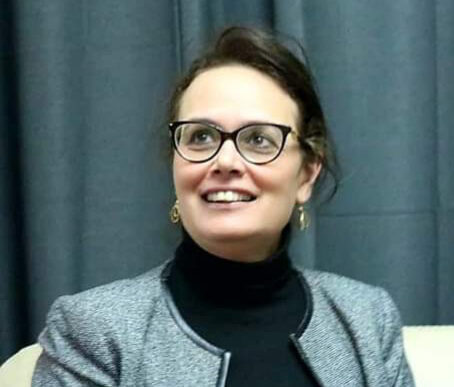
In recent weeks, Prime Minister Netanyahu and Health Minister Yuli Edelstein have visited Arab towns and called on Arab Israelis to get vaccinated. But Daoud says that this is not enough, claiming that it is not only a matter of principled reluctance to get vaccinated. She, and many mayors of Arab localities call for steps such as creating vaccine mobiles, opening vaccination centers in each Arab locality, providing appropriate information and making appointments more accessible as steps that will get the Arab public vaccinated.
According to Daoud, the Arab community has a lower life expectancy, and therefore has a smaller population of elderly than the Jewish community, most of whom are women who are less mobile. This population often has less access to health services in general.
"The rate of Internet users is lower among Arab adults. The older Arab population, aged 60 plus, is a less educated and less accessible group,” she explained. “It is necessary to set appointments differently, and with greater effort on the part of the system.”
Moder Younes, chairman of the Forum of Arab Local Authorities, and Faiz Abu Sahiban, mayor of Rahat, also warned in a letter to the health minister and the prime minister that the low immunization rate was due to fears of overcrowding in the immunization centers and the difficulty of reaching them. They wrote that many people aged 60 plus in the Arab community "kept themselves socially distanced from their families for almost a whole year."
Following the letter, coronavirus czar Nachman Ash came to visit Rahat, and promised to send a vaccine mobile to the Bedouin communities in the Negev.
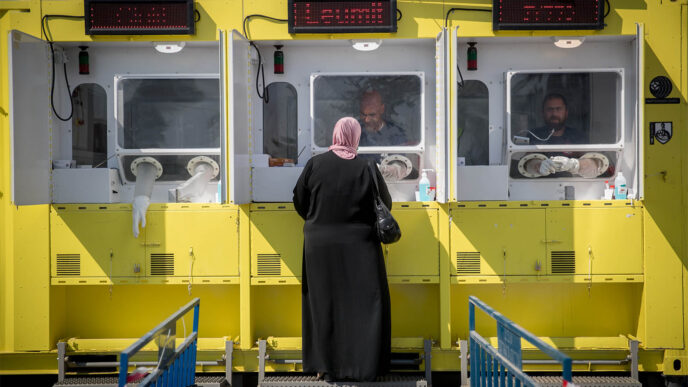
Daoud demands the government to improve its messaging encouraging vaccination.
"Sometimes people's decisions are based on incorrect facts. There is no access to objective information. This is a group that is less critical of information on social networks. The role of the system is to make a campaign suitable for the population," she said.
"When you tell the population that they are less likely to get vaccinated, the message is 'do not come, because if you come you will be an exception to the rule,'” Daoud continued. “These are negative messages.”
“The vaccine is the key to a return to normalcy”
The ultra-Orthodox community, while displaying low vaccination rates by area compared to other areas of Israel, has rallied in support of vaccination, in an effort led by its spiritual leaders. This campaign was started to combat fears of widespread distrust of the government and spreading of fake news about the vaccine.
Avi Blumenthal, an ultra-Orthodox adviser to the Ministry of Health, told Walla News that "Pashkvils [campaign posters] were spread that claimed that the vaccine is supposedly against the Torah, but in the end common sense prevailed, thanks in part to the activities of Rabbi Elimelech Firer, who presented the great rabbis with the information that was the deciding factor to support the vaccine."
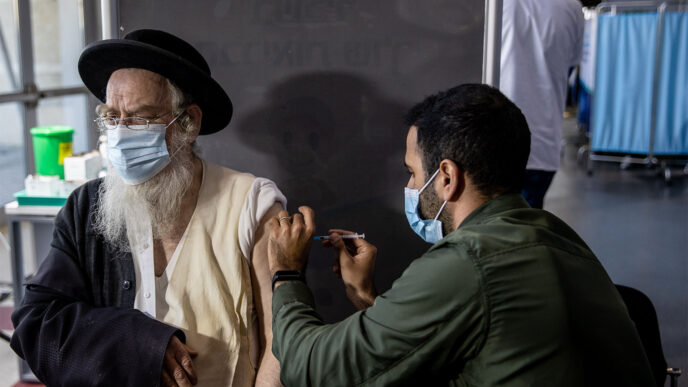
After this, many members of the rabbinical leadership of the different sects publicized the accounts of their own vaccinations, in an effort to encourage the public.
"Once the public saw that, the saga was over," Blumenthal told Walla News. "There is a consensus around the fact that the vaccine is the key to a return to normalcy and a desire among the ultra-Orthodox public to put the corona crisis behind us.”
The ultra-Orthodox community makes up a large portion of coronavirus cases, with 8% of all hospitalized patients, 11% of all deaths in Israel, and a quarter of all patients total, according to Major General Roni Numa, coronavirus supervisor of the ultra-Orthodox sector. As of 2016, the ultra-Orthodox community was 10.5% of the total population.






